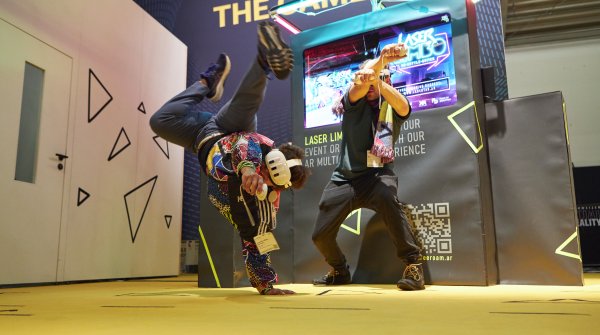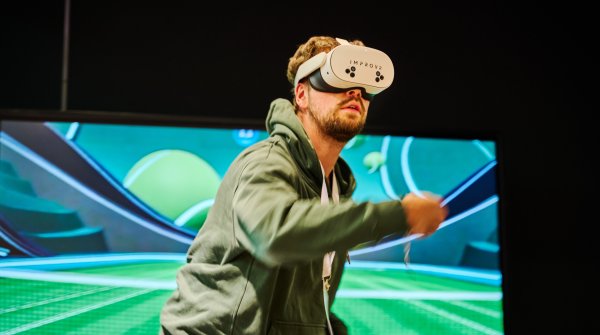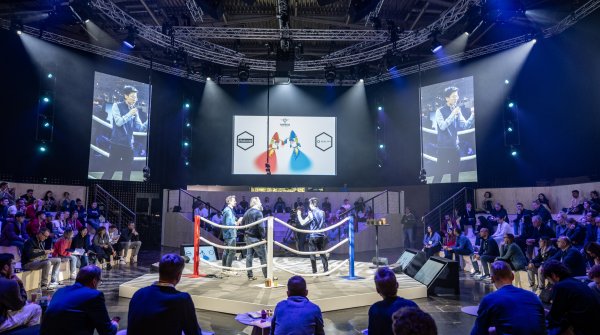Move2Earn is also known as Play2Health or Burn2Earn. All terms indicate the concept's close connection to the fitness industry. There are already Move2Earn programs on Web 3.0 that people can participate in. These programs are mainly games. In them, one can earn a reward, often cryptocurrencies or NFTs, by completing fitness tasks. In other words, you get an incentive and a financial reward for taking care of your health.
Move2Earn typically uses wearables, GPS services, motion trackers, pedometers, or simply a smartphone to monitor participants' physical activity. The players:inside have to move according to the requirements to achieve the fitness goals of the game. In this way, they earn tokens that can be converted into barter currency. The tasks can range from casual exercises to intense workouts.
One of the main criticisms of modern communication technology is that it tempts people to be lazy, dull and sluggish. Instead of engaging in physical activity, we spend our time in front of screens. Move2Earn debunks this criticism. Because the main motive behind the Move2Earn concept is to create a health-conscious society.
The concept motivates people to engage in physical activity in order to earn rewards. This monetary motivation enables them to engage in consistent physical activity and thus stay fit and healthy.
Typical fitness applications are the logical predecessors of Move2Earn applications and projects. Almost everyone knows or uses some of them: Freeletics, Nike Run Club, Asana Rebel - just to name a few examples. They offer users insights, tips and training opportunities via their app, but usually no rewards or incentives other than some gamification elements. On the contrary, most of the time users had to pay for the apps and their features, often significant amounts of money.
The main difference between Move2Earn programs and the other fitness apps is exactly this concept of incentivization. Although users* often have to pay some kind of start-up fee, for example by buying an NFT or a certain amount of a cryptocurrency, they can later earn new NFTs or cryptocurrencies in the Move2Earn app. In other words, they can earn money by playing sports. Some people even try to go so far as to make Move2Earn their full-time job.
To give you a better understanding of the programs and their scope of features, let's take a look at some of the most popular apps from this area.
STEPN is a fitness app that provides cryptocurrencies, namely GMT and GST tokens, as rewards for its active users*. It records the activities via an app on your smartphone and rewards them accordingly.
STEPN uses GPS to track the user's movements. So you can't use the app in a gym or stationary workouts. Although in the STEPN app three modes of operation are available, two are under development; therefore, users* must sign up for solo mode.
Once logged in, users must select one from a collection of digital sneakers (NFT). Each digital sneaker is associated with an expected walking speed. So if you walk slower than the minimum speed of the sneaker, you won't get any reward. You can choose walking, running or jogging shoes depending on your needs.
The number of sneakers purchased determines the amount of time you can spend in the application, earning points with exercise. With a pair of running shoes, users* have only about ten minutes of play time. Therefore, they have to use part of their tokens for in-app purchases to advance in the game and buy more shoes. This is the only way they can play longer and earn more.
The company's website interestingly mentions big names of traditional sports brands like Scott Dunlap, Vice President of Adidas, as advisors.
Pros
- Robust mechanisms against fraud: The application only tracks natural movements. So using vehicles to cover long distances does not work well in the app.
- In-app purchases and limited activity time keep token fluctuation in check.
- There are additional random rewards like mystery boxes.
- Extremely high user count: the Move2Earn platform had over 1 million daily active users during its peak.
Cons
- High barriers to entry: The app is not really user-friendly and new users* cannot start playing right away. The entire app and all of its features are quite difficult to understand, and there are little to no explanations within the app (although there are help documents on the website).
- Since the app is based on the Solana blockchain, you will need some SOL (cryptocurrency) to start the game and make your first purchases.
- Extremely volatile returns: The price of GMT and GST tokens has dropped significantly in the last year.
Step App is a playful Metaverse version of a fitness application that is very similar to STEPN. Users can play, jog or run to learn, have fun and earn rewards in Step App.
The Step app uses FITFI tokens for its transactions. It provides an in-app account where the FITFI tokens are stored. During the initial registration, users* need to buy some FITFI tokens and transfer them to the account. Then, one can take the challenges.
The app has a marketplace where users* can buy goods such as sneakers (NFT). Although you can later upgrade the sneakers with the earned tokens, you have to spend your own cryptos to buy the first pair of sneakers.
Once a user* owns a sneaker, he or she can move around and earn FITFI tokens that can be converted into barter currency.
Step App was able to attract Usain Bolt as a brand ambassador and is a good example of what an easy-to-use Move2Earn app with little to no barriers to entry can look like.
Pros
- Easily accessible app with little to no barriers to entry
- Robust token regulation to balance cryptocurrency supply and demand
- Features like "staking"
- The feature to gift a sneaker to another user.
- Synchronization with users* health app.
Cons
- Limited play time
- In-app purchases lead to spending most of the in-app revenue.
Sweatcoin is a fitness app that tracks users' steps throughout the day, generating SWEAT cryptos.
Sweatcoin has been around for a long time, and they report 120 million active users on their Web 2.0 and Web 3.0 platforms. In 2022, Sweatcoin was even the number one downloaded health and fitness app. The program also launched a SWEAT cryptocurrency with its SWEAT account.
Sweatcoin has now entered the Move2Earn and Web 3.0 space. By using this new web 3 app, similar to Sweatcoin, one is rewarded for the number of steps he takes each day.
When the cryptocurrency version of the app launched, the user received 1 SWEAT for 1000 steps. Over time, the difficulty of minting the coin increases, similar to Bitcoin, and users need a few thousand steps to earn SWEAT tokens.
So basically, users* don't need to do anything other than download an app and take steps. Already, cryptocurrency can be earned, which can be converted into barter currency. This makes the list of pros and cons for the app pretty short.
Pros
- Exceptionally simple and with no barriers to entry
- Since SWEAT uses blockchain technology, users* can track their activities and transactions in a secure and transparent way while maintaining their privacy.
Cons
- SWEAT's value is relatively low, hovering around $0.05 at the time of writing.
As you can see, the Move2Earn industry is on the rise. Hundreds of millions of users, celebrities and companies are entering this field with excessive speed. But is it all worth it? Is it just hype or a real game changer?
The Move2Earn concept has been making high waves in the crypto industry for some time now and is revolutionizing the entire fitness industry in many ways.
Move2Earn innovates traditional fitness apps by enabling real-time activity tracking. They offer the ability to sync users* health apps with the Move2Earn platform for comprehensive fitness tracking. Although traditional apps do the same, Move2Earn is much more.
Move2Earn also creates incentives for users* to effectively achieve their fitness goals. The incentives have helped fitness routines to be followed more consistently, which inevitably contributes to a fitter community.
With the introduction of the Move2Earn platforms, user*s engagement with their fitness program has reached record levels. The engaging experience, incentives, and random rewards motivate users* to stick to their workout plans.
Move2Earn platforms have come a long way: Since the early days of STEPN, programs have evolved tremendously as many providers such as SWEAT, Step App, etc. have introduced advanced features that even include spending tokens in the real world.
Move2Earn platforms have the potential to transform the fitness industry if they can get a handle on issues such as poor "token economics" and oversupply of tokens.
Move2Earn has revolutionized the fitness industry since its inception last decade with its incentive-based approach and intense user experience. Move2Earn is undoubtedly the next big thing in the fitness industry, as it has outstanding potential.
Although Move2Earn is still in its early stages, it has already generated over $1 billion worth of revenue. With the incorporation of Web 3.0 technology, blockchain, the right tokens, the introduction of top players in the market, etc., the business potential of the Move2Earn industry will soon soar even higher.
There are efforts to make Move2Earn tokens usable outside the application, which could give the industry a lot of traction and investment opportunities.
The importance of Move2Earn platforms will surely reach greater popularity due to their broader health aspects. The fact that Move2Earn encourages the community to lead an active lifestyle while helping them earn from it makes it the best possible physical activity intervention, even in the real world.
With the right incorporation of advanced technologies and the right attempts to solve the problems of Move2Earn platforms and connect the hype with reality, the concept of Move2Earn and the platforms involved will surely have a long journey ahead.
 SportsTechVR training: the game changer for athletes?
SportsTechVR training: the game changer for athletes? SportsTechSport meets AI: gamification and more
SportsTechSport meets AI: gamification and more
- Awards
- Mountain sports
- Bike
- Fitness
- Health
- ISPO Munich
- Running
- Brands
- Sustainability
- Olympia
- OutDoor
- Promotion
- Sports Business
- Textrends
- Triathlon
- Water sports
- Winter sports
- eSports
- SportsTech
- OutDoor by ISPO
- Heroes
- Transformation
- Sport Fashion
- Urban Culture
- Challenges of a CEO
- Trade fairs
- Sports
- Find the Balance
- Product reviews
- Newsletter Exclusive Area
- Magazine




